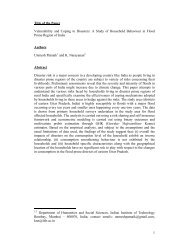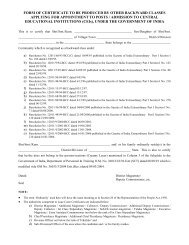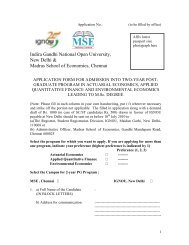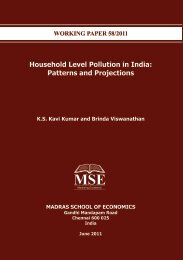Management of Municipal Solid Waste - Envis
Management of Municipal Solid Waste - Envis
Management of Municipal Solid Waste - Envis
You also want an ePaper? Increase the reach of your titles
YUMPU automatically turns print PDFs into web optimized ePapers that Google loves.
MANAGEMENT OF MUNICIPAL SOLID WASTE<br />
Writ Petition (Civil) No.286/1994, Dr.B.L. Wadehra Vs Union <strong>of</strong> India &<br />
Ors.<br />
This Writ Petition was filed under Article 32 <strong>of</strong> the Constitution <strong>of</strong> India. The<br />
Petitioner prayed before the Hon'ble court to issue directions to the <strong>Municipal</strong><br />
Corporation <strong>of</strong> Delhi (MCD) and New Delhi <strong>Municipal</strong> Council (NDMC) to take<br />
action in accordance with the <strong>Municipal</strong> Laws specifically for collection, removal<br />
and disposal <strong>of</strong> garbage and other wastes. On the directions <strong>of</strong> the Hon'ble<br />
Supreme Court, the concerned authorities filed their replies. In its reply the MCD<br />
submitted that the total number <strong>of</strong> garbage collection centres were 1604 (337<br />
dalao, 1284 dustbins, 176 open sites and 7 steel bins). The garbage collection<br />
trucks collected the garbage from the collection centres and took it to the<br />
nearest Sanitary Land Fill (SLF). In its reply, NDMC stated that average <strong>of</strong> 300-<br />
350 tonnes <strong>of</strong> garbage generated in the NDMC area and there were 944 garbage<br />
collecting places (650 trolleys and 394 dustbins). The Court on 1.3.1996 passed<br />
the order that the ambient air was so much polluted that it was difficult to<br />
breath. The people <strong>of</strong> Delhi were suffering from respiratory diseases and throat<br />
infections. River Yamuna, - the main source <strong>of</strong> drinking water supply – was the<br />
free dumping place for untreated sewage and industrial waste. The rapid<br />
industrial development, urbanization and regular flow <strong>of</strong> persons from rural to
urban areas had made major contribution towards environmental degradation.<br />
Apart from Article 21 <strong>of</strong> the Constitution <strong>of</strong> India which guarantees "Right to<br />
Live" Article 48A and 51A (g) <strong>of</strong> the Constitution are as under : -<br />
"Article 48A - Protection and improvement <strong>of</strong> environment and safeguarding <strong>of</strong><br />
forests and wildlife - the State shall endeavour to protect and improve the<br />
environment and to safeguard the forests and wild life <strong>of</strong> the country.<br />
Article 51A(g) – To protection and improve the natural environment including<br />
forests, lakes, rivers and wildlife and to have compassion for living creatures".<br />
In light <strong>of</strong> the facts and circumstances stated above, the following directions<br />
were issued for compliance<br />
1. The experimental schemes <strong>of</strong> MCD and NDMC for distribution <strong>of</strong><br />
polythene bags, door-to-door collection <strong>of</strong> garbage and its disposal<br />
was approved. The garbage/waste should be lifted from the collection<br />
centers everyday and transported to the designated place for<br />
disposal. All receptacles/collection centers should be kept clean and<br />
tidy everyday.
2. The Government <strong>of</strong> India through its Secretary, the Ministry <strong>of</strong><br />
Health, Government <strong>of</strong> NCT <strong>of</strong> Delhi, MCD through its Commissioner<br />
and NDMC through its Administrator were to construct and install<br />
incinerators in all the Hospitals/Nursing Homes with 50 beds and<br />
above under their Administrative control. This was to be done within<br />
9 months.<br />
3. The All India Institute <strong>of</strong> Medical Sciences through its Director was to<br />
install sufficient number <strong>of</strong> incinerators to dispose <strong>of</strong> the hospital<br />
waste.<br />
4. The MCD and NDMC were to issue notices to all the private<br />
hospitals/nursing homes in Delhi to meet their own arrangements for<br />
the disposal <strong>of</strong> their garbage and hospital waste and construct their<br />
own incinerators.<br />
5. The Central Pollution Control Board and the Delhi Pollution Control<br />
Committee should send their inspection team regularly in different<br />
areas <strong>of</strong> Delhi and New Delhi to ascertain that the<br />
collection/transportation and disposal <strong>of</strong> garbage/waste was carried<br />
out satisfactorily. The Central Pollution Control Board and the Delhi<br />
Pollution Control Committee should file their reports after every two<br />
months for a period <strong>of</strong> two years.<br />
6. The Government <strong>of</strong> NCT <strong>of</strong> Delhi was to appoint <strong>Municipal</strong><br />
Magistrates (Metropolitan Magistrates) for the trial <strong>of</strong> <strong>of</strong>fences under<br />
the MCD Acts and NDMC Acts. Residents <strong>of</strong> Delhi were to be<br />
educated through Doordarshan that they should be liable for penalty<br />
in case they violate any provision <strong>of</strong> these Acts in the matter <strong>of</strong><br />
collecting and disposal <strong>of</strong> garbage and other wastes.<br />
7. The Doordarshan through its Director General was to undertake a<br />
programme <strong>of</strong> educating the residents <strong>of</strong> Delhi regarding their civic<br />
duties under the Delhi Act and New Delhi Act.
8. The Secretary, Ministry <strong>of</strong> Defence Production, Government <strong>of</strong> India<br />
should make arrangements to have the 200 tippers supplied to MCD<br />
as expeditiously as possible.<br />
9. The Development Commissioner, Government <strong>of</strong> NCT <strong>of</strong> Delhi was to<br />
handover the two sites near Badarpur or Jaitpur/Tejpur quarry pits<br />
and Mandi Village near Jaunpur quarry pits. These sites were to be<br />
handed over to MCD within three months.<br />
10. The compost plant at Okhla should be revived and put into operation<br />
w.e.f.1.6.1996 and four additional compost plants as recommended<br />
by Jagmohan Committee should also be examined for construction.<br />
11. The MCD should not use the filled up Sanitary Land Fills (SLF) for any<br />
other purposes except for forest and gardens. The MCD was to<br />
develop forests and gardens on these sites. The work <strong>of</strong> aforestation<br />
should be undertaken by the MCD w.e.f. 1.4.1996.<br />
12. The MCD and NDMC should construct/install additional garbage<br />
collection centers in the form <strong>of</strong> dhalaos/trolley/steel bins within four<br />
months.<br />
13. The Union <strong>of</strong> India and NCT/Delhi Administration were to consider the<br />
request from MCD and NDMC for financial assistance.<br />
14. The NCT/Delhi Administration and MCD and NDMC were to engage an<br />
expert body like NEERI to find out alternate method or methods <strong>of</strong><br />
garbage and solid waste disposal in case non-availability <strong>of</strong> SLF<br />
methods.<br />
Earlier, in compliance <strong>of</strong> the Hon'ble Supreme Court's order dated 1.3.1996 and<br />
23.1.1998 the Central Pollution Control Board conducted inspection and surveyed<br />
different areas <strong>of</strong> Delhi/New Delhi to ascertain the collection transportation and<br />
disposal <strong>of</strong> garbage/waste and submitted bi-monthly reports to the Supreme<br />
Court. In its reports the Central Board made recommendations in respect <strong>of</strong><br />
collection transportation and disposal <strong>of</strong> garbage/waste. In all 11 reports have<br />
been submitted in the Supreme Court by the CPCB. As per estimate <strong>of</strong> the CPCB
the municipal solid waste (MSW) generated in Delhi was around 4000-5000<br />
tonnes per day in 1997 and is likely to go as high as 10,000 tonnes per day in<br />
2005. In view <strong>of</strong> these estimates, the CPCB observed that there will be<br />
tremendous strain on municipal infrastructure services in terms <strong>of</strong> water supply,<br />
waste water collection, conveyance and treatment, and disposal <strong>of</strong> municipal<br />
solid waste. This Writ Petition was transferred on 23.1.1998 to the Hon'ble High<br />
Court <strong>of</strong> Delhi.


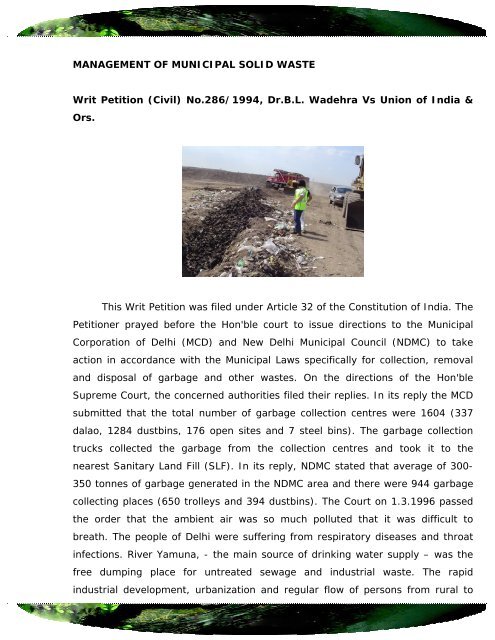
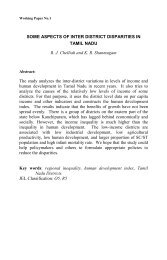
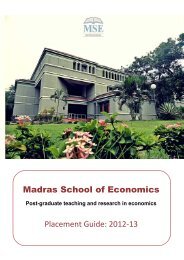
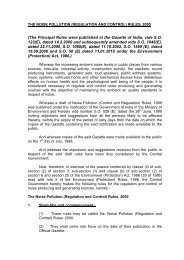
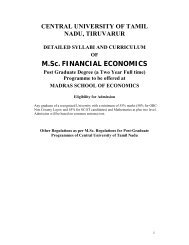
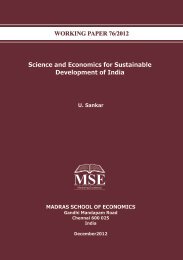
![Curriculum Vitae [pdf] - Madras School of Economics](https://img.yumpu.com/49878970/1/190x245/curriculum-vitae-pdf-madras-school-of-economics.jpg?quality=85)
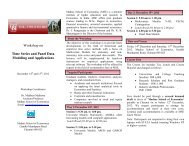
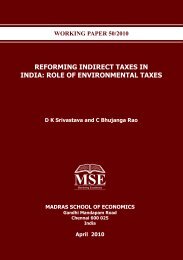
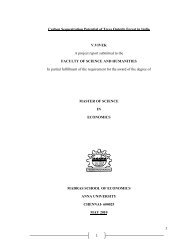
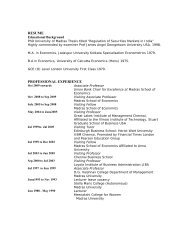
![Curriculum Vitae [pdf] - Madras School of Economics](https://img.yumpu.com/48715201/1/184x260/curriculum-vitae-pdf-madras-school-of-economics.jpg?quality=85)
